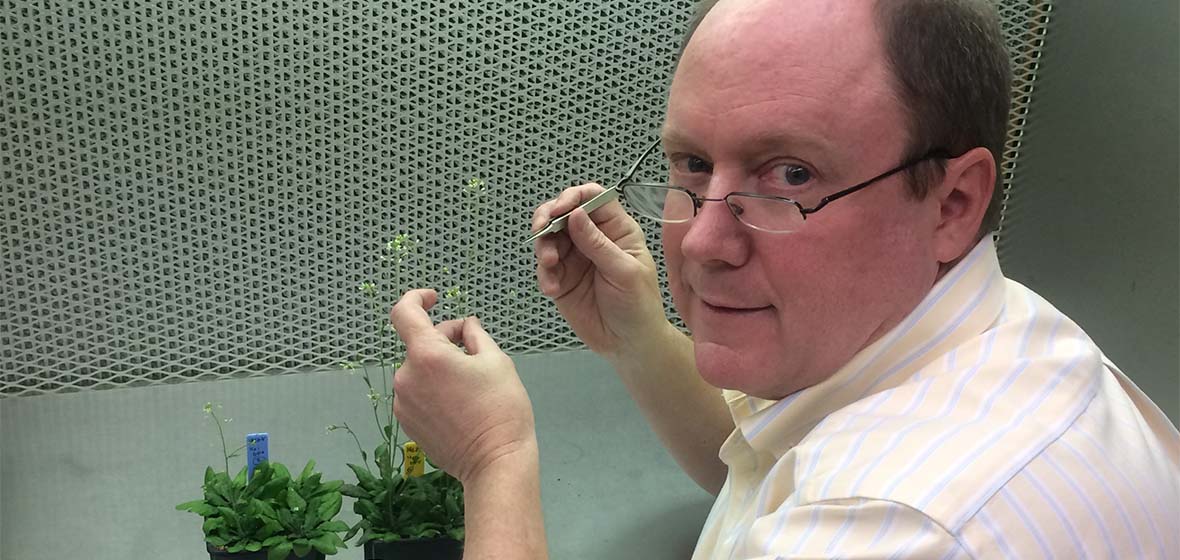Jeffrey Harper, a professor in the Department of Biochemistry and Molecular Biology at the University of Nevada, Reno, has been elected as a 2016 American Association for the Advancement of Science Fellow for his scientifically or socially distinguished efforts to advance science or its applications. The AAAS is the world's largest general scientific society and publisher of the journal Science.
In October, Harper and 391 other new fellows were elected by the AAAS Council in recognition of their contributions to innovation, education and scientific leadership. Harper joins several other AAAS Fellows at the University, including University Executive Vice President and Provost Kevin Carman; Gary Blomquist, professor in the Department of Biochemistry and Molecular Biology; Tom Nickles, professor of philosophy; and William Payne, professor and dean of the College of Agriculture, Biotechnology and Natural Resources, among others.
"This honorary recognition reflects well not only on Jeff Harper as an individual scientist, but as well on his department, the college and indeed the University," Payne said. "We are very proud of Jeff."
Harper began teaching as an associate professor at the University in 2004, and has been teaching introductory biochemistry at the junior and senior level since 2008. He is now a full professor and mentors undergraduate and graduate researchers in the lab.
"An experiential learning experience in a lab provides important insights into how new knowledge is created," Harper said. "New knowledge is created every day, and is constantly changing our society. Even a short research experience can teach a student that regardless of a career choice, each of us is born a scientist - capable of creating new knowledge, and using that knowledge to make informed decisions."
Harper has received several high honors throughout his career including Researcher of the Year within the college in 2009 and Fellow of the American Society of Plant Biology in 2013. He has also co-authored over 100 publications related to his research.
{{RelatedPrograms}}
Harper's research interests include plant biology, calcium signal transduction, pollen and temperature and drought stress. His research interests are tested in the Harper lab, as their main interest is in how a plant can use as few as 28,000 genes to develop and survive extreme environmental conditions, such as cold, heat, drought and salt stress. Another primary focus is on calcium signaling. The lab employs genetic, cell, bioinformatics and biochemical approaches using Arabidopsis and yeast as model systems.
Harper is currently a part of a group of plant scientists at the University who are working to set up a Center for Dryland Agriculture. According to Harper, one of the group's primary goals is "to develop and breed water-efficient and drought-tolerant crop plants that can make significant contributions to local production of food, fuels, nutraceuticals and structural materials."
Better management of dryland agricultural systems, including animal-based systems that are productive, resilient to climate change, and maintain or enhance the environment are other goals of the Center, according to Payne. He further explained that the Center is expected to have international significance.
Harper and other 2016 AAAS Fellows will be presented with an official certificate and a gold and blue rosette pin, representing science and engineering, respectively, on Saturday, Feb. 18 at the AAAS Fellows Forum during the 2017 AAAS Annual Meeting in Boston.
NevadaToday
University professor elected as 2016 American Association for the Advancement of Science Fellow
Jeffrey Harper, professor of molecular biosciences, joins the select few AAAS Fellows at the University

Jeffrey Harper working on a genetic cross with Arabidopsis, which is their model system for an oil seed crop











